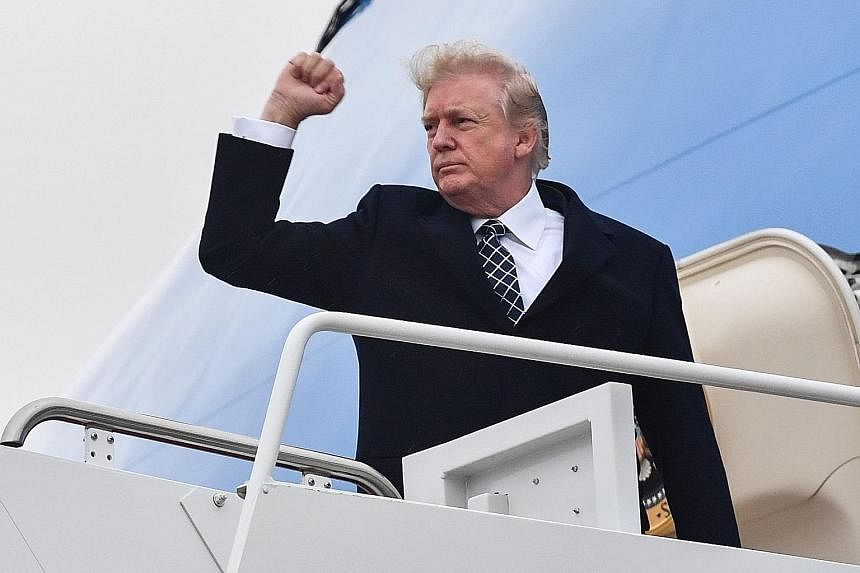DUBAI/WASHINGTON • Iran said yesterday it would retaliate against sanctions imposed on its judiciary head by the United States, as US President Donald Trump stepped up efforts to "fix" a nuclear deal between Teheran and major powers.
Mr Trump said on Friday he would waive nuclear sanctions against Iran for the last time to give Washington and its European allies a chance to fix the "terrible flaws" of the 2015 nuclear deal.
But Washington also announced sanctions against 14 entities and people, including the head of Iran's judiciary, Ayatollah Sadeq Larijani.
"The Trump regime's hostile action (against Ayatollah Larijani)... crossed all red lines of conduct in the international community and is a violation of international law and will surely be answered by a serious reaction of the Islamic Republic," Iran's Foreign Ministry said in a statement carried by state media.
Mr Trump had warned European allies and Congress they have to work with him to fix "the disastrous flaws" in the pact or face a US exit.
The ultimatum puts pressure on Europeans - key backers and parties to the 2015 international agreement to curb Iran's nuclear programme - to satisfy Mr Trump, who wants the pact strengthened with a separate agreement within 120 days.
Iranian Foreign Minister Mohammad Javad Zarif responded on Twitter that the deal was not renegotiable, and that Mr Trump's stance "amounts to desperate attempts to undermine a solid multilateral agreement".
"Rather than repeating tired rhetoric, US must bring itself into full compliance - just like Iran," Mr Zarif tweeted immediately after Mr Trump's speech.
Russia yesterday said Washington would be making a grave mistake by pulling out of the Iran nuclear deal, adding that Moscow would work hard to keep the landmark agreement alive.
Deputy Foreign Minister Sergei Ryabkov said Moscow must unite with Europe and China and undertake "intense work" to keep the existing plan intact, and decried what he said was a US attempt to strong-arm the situation.
"In what we heard yesterday, I don't see any invitation for Iran to enter dialogue," he said.
"This defies the logic of the agreement... Russia will do everything in its power to save the agreement." The European Union said it had taken note of Mr Trump's decision and would assess its implications. Two EU diplomats said EU foreign ministers will discuss what to do now at their next regular meeting, scheduled for Jan 22 in Brussels.
But a European diplomat, speaking on condition of anonymity, said: "It's going to be complicated to save the deal after this."
Mr Trump laid out several conditions to keep the US in the deal.
Iran must allow "immediate inspections at all sites requested by international inspectors", he said, and "sunset" provisions imposing limits on Iran's nuclear programme must not expire.
He also said US law must tie long-range missile and nuclear weapons programmes together, making any missile testing by Iran subject to "severe sanctions".
One senior administration official said Mr Trump would be open to remaining in a modified deal if it were made permanent.
The President wants Congress to modify a law that reviews US participation in the nuclear deal to include "trigger points" that, if violated, would lead to the United States reimposing its sanctions, the official said.
Meanwhile, a United Nations panel has concluded that Iran violated an arms embargo imposed on Yemen by failing to prevent the Houthi rebels in that war-ravaged nation from obtaining Iranian missiles, including one fired hundreds of kilometres into Saudi Arabia two months ago.
The findings, in a report given to the UN Security Council this week, could add weight to American and Saudi efforts to ostracise Iran with accusations that the Iranians are engaged in destabilising behaviour in the Middle East.
The UN panel's report did not say Iran had supplied missiles to the Houthis.
But by failing to keep such weapons out of Yemen, the report said, "the Islamic Republic of Iran is in non-compliance" with Resolution 2216, adopted nearly three years ago after the war between the Houthi rebels and the Saudi-backed government in Yemen had begun.
REUTERS, AGENCE FRANCE-PRESSE, NYTIMES

